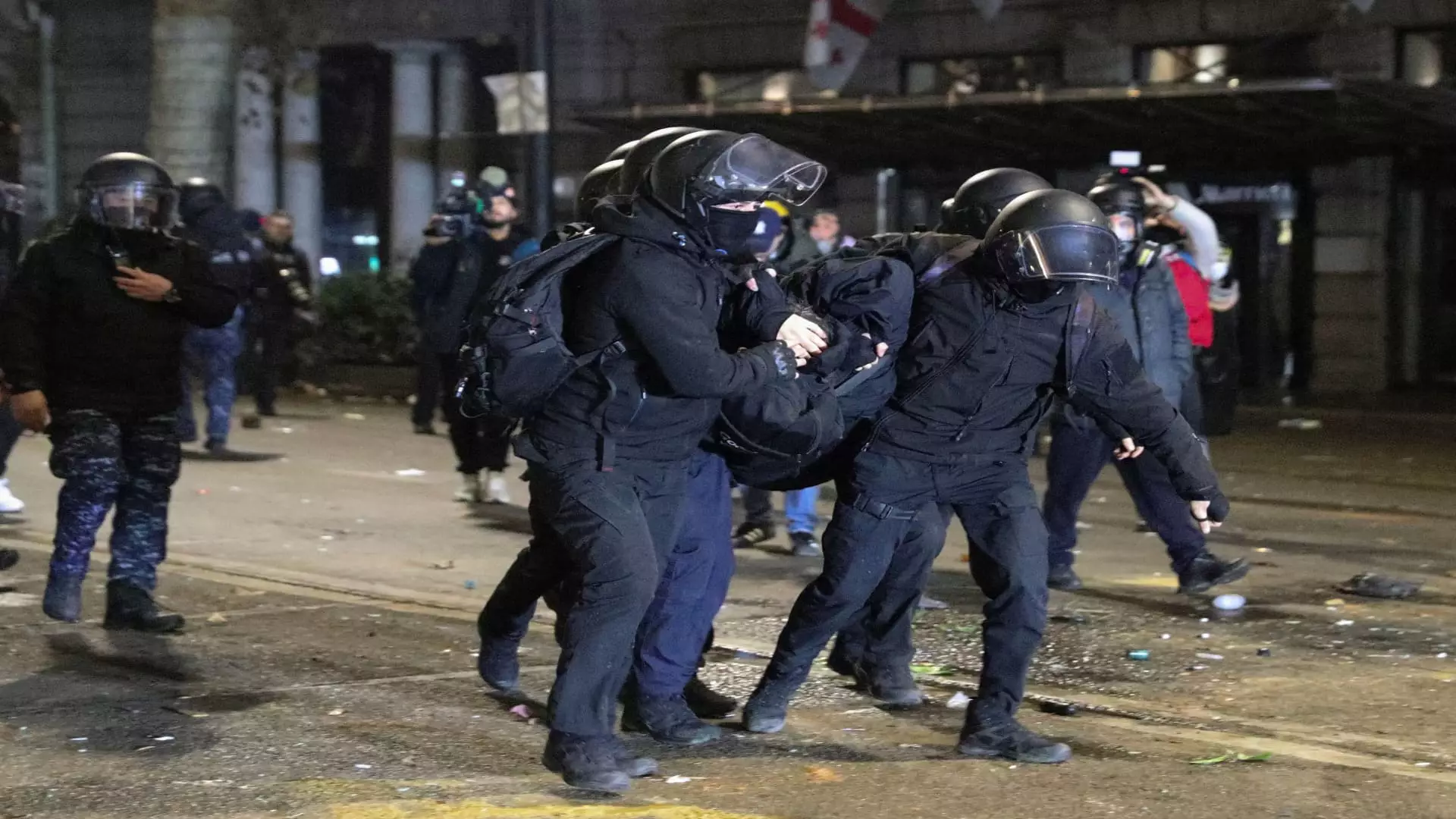Recent events in Georgia have underscored the nation’s volatile political landscape, as mass protests erupted in the capital following the government’s controversial decision to halt negotiations aimed at joining the European Union (EU). Reports indicate that during the height of these protests, which took place over a weekend, at least 44 individuals were hospitalized due to clashes between demonstrators and law enforcement. Thousands congregated outside the Parliament, expressing their discontent through stone-throwing and fireworks while police countered with tear gas and water cannons. The intensity of the protests peaked as an effigy of Bidzina Ivanishvili, the enigmatic leader of the ruling Georgian Dream party, was set ablaze outside the legislature, centralizing the grievances of the public against the current regime.
In the face of escalating unrest, Georgian Prime Minister Irakli Kobakhidze delivered a stern warning to the protesters, emphasizing the government’s zero-tolerance policy towards law violations. His statement was laced with a sense of defiance as he insisted that the nation’s aspirations for European integration were far from thwarted. Kobakhidze portrayed the government’s rejection of certain demands as a stand against “shameful blackmail,” suggesting that the obstacles to integration were externally imposed rather than intrinsically caused by the government’s decisions.
However, this narrative was quickly countered by international actors, specifically the European Parliament, which had recently adopted a resolution condemning the previous month’s elections in Georgia as unfair and unfree. The conflict between the government’s perspective and widespread domestic dissent illustrates a chasm that may grow deeper if not addressed. Critics contend that the ruling party’s actions betray Georgia’s longstanding European ambitions, which have become a cornerstone of the nation’s identity following its independence from the Soviet Union.
A Rising Tide of Opposition
The discontent with the Georgian Dream party also reached broader political implications, particularly concerning the legitimacy of the reported electoral processes. The closely contested elections held on October 26, perceived by many as a referendum on EU accession, have been marred by accusations of fraud and manipulation, allegedly facilitated by influences from Russia. The administration’s reluctance to acknowledge these irregularities has led to a significant boycott from opposition parties within the parliament, fueling calls for a new electoral process under conditions designed to protect the integrity of the vote.
As the political rhetoric intensifies, figures such as President Salome Zourabichvili have labeled the situation dire, characterizing Georgia’s drift towards a “quasi-Russian” state. This alarming observation reflects concerns that the current regime is consolidating power in a manner reminiscent of autocratic governance, undermining democratic structures within the country. Zourabichvili’s insistence on the need for new elections suggests an unwillingness to accept the status quo and an aspiration for a political reset aimed at aligning Georgia more closely with the EU.
International attention has turned sharply toward Georgia, particularly following the U.S. State Department’s announcement of a suspension in its strategic partnership with the nation in reaction to the government’s EU accession halt. Officials have cautioned that this freeze symbolizes broader geopolitical repercussions, as Georgia walks a precarious tightrope between Western aspirations and Russian influence. The national dialogue, it seems, is not only about local governance but also encapsulates the larger narrative of post-Soviet space, where the fates of nations hang in a delicate balance influenced by great power politics.
In response to these events, the EU has reiterated its commitment to supporting Georgia’s democratic aspirations, voicing serious concerns regarding the nation’s political trajectory. The union emphasized the importance of respecting fundamental rights, particularly in the context of peaceful protests and freedom of expression. Whether the Georgian government will heed these warnings remains uncertain, as the tension between the ruling party’s ambitions and public discontent continues to simmer.
Georgia stands at a crucial juncture in its quest for European integration amidst a backdrop of civil unrest, political strife, and international scrutiny. As citizens demand accountability and a reaffirmation of their European goals, the government’s capacity to navigate these tumultuous waters will largely define the nation’s path forward. The aspirations of Georgians to align with Europe may hinge on the ability of their leaders to respond to public sentiment, address concerns of electoral integrity, and foster a genuine commitment to democratic principles. The next steps taken by the Georgian leadership in addressing these challenges will not only influence domestic stability but also shape Georgia’s role in the ever-evolving geopolitics of the region.


Leave a Reply